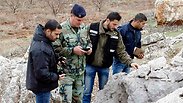
Rocket launch site in Lebanon
צילום: רויטרס
Israel's message to Hezbollah, Lebanon and Syria
The rocket fire from Lebanon was likely the work of some small group aiming to divert Hezbollah forces to southern Lebanon, but Israel will not tolerate ongoing rocket fire on its civilian population
The rocket fire from Lebanon on northern Israel on Sunday morning likely has more to do with the civil war being waged in its neighbor and erstwhile patron Syria, than any great battle with the Zionist enemy.
Those launching the rockets were apparently aiming to crank up the already high tensions in Lebanon, forcing Hezbollah and the Lebanese army to bolster their forces in the south of the country, instead of sending them to help the Assad regime in Syria, the clashes in northern Lebanon or the tumultuous Palestinian refugee camps in the Sidon area.
Related stories:
- Rocket from Lebanon hits northern Israel; IDF responds with 'massive barrage'
- Hezbollah says commander killed in Beirut, blames Israel
- Hezbollah report reveals details of operative's assassination
It's fairly clear from the rocket launch site that this was not the work of professionals, established groups or state actors.
Just one of the five rockets fired from the area of the village of Al-Khiam in southeast Lebanon landed in Israeli territory, a fair distance from Kiryat Shmona. It seems that the trajectory was faulty; these rockets were Grads, capable of striking multiple areas in Israel, yet four of them missed their target and fell inside Lebanon. (The weather also did not work in their favor – the low clouds over Lebanon were not conducive to firing projectiles without the help of computer technology.) Furthermore, no great planning or consideration had gone into the selection of the launch site; this was a random location without a good escape route for the protagonists.
This was clearly not the work of Hezbollah. Rather, it was an armed group who wanted to force Hezbollah and the Lebanese army to focus their forces in southern Lebanon, thereby easing the pressure on the Sunni rebels battling Assad in Syria and the Sunnis fighting the army and the Shiite Hezbollah in northern Lebanon.
This is not the first attempt to exacerbate tensions in southern Lebanon in order to aid the Sunnis fighting Assad's regime in Syria. Hezbollah is a well-known Assad ally, and tensions with Israel in southern Lebanon would compel it to deploy forces to that area rather than dispatch them to fight in Syria.
There are also Palestinians in play in that area, who support the rebels in Syria, some of whom are also allied to Jihadist organizations in Lebanon. These Jihadist groups include the Abdullah Azzam Brigades, which took responsibility for previous rocket fire in the Nahariya area, and for the assassination of senior Hezbollah member Hassan al-Laqqis earlier this month (Hezbollah even so blamed Israel for the death of al-Laqqis, the group's head of technology).
Israel's response to Monday's rocket fire – launching dozens of mortars at Lebanon – was essentially an automatic reaction intending to make it clear to the Lebanese government and UNIFIL that Israel will not tolerate any violations of United Nations resolution 1701, implemented in the wake of the 2006 Lebanon-Israel war.
It was also more severe than after the previous rocket attack to remind them that they are responsible for preventing such incidents, and that if there are more efforts to drag Israel into the Syria conflict, which has now spilled over in Lebanon, then Israel will carry out a more extensive, less pinpoint response than in the past.
The dozens of mortars fired by the IDF on Monday morning were to reinforce the notion that Israel will not become an ongoing factor in the Syrian and Lebanese conflicts, nor for a drip-drip series of attacks that claim Israeli victims.










